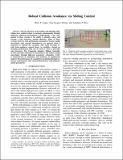Robust Collision Avoidance via Sliding Control
Author(s)
Lopez, Brett T.; Slotine, Jean-Jacques E; How, Jonathan P.
DownloadAccepted version (3.464Mb)
Terms of use
Metadata
Show full item recordAbstract
Recent advances in perception and planning algorithms have enabled robots to navigate autonomously through unknown, cluttered environments at high-speeds. A key component of these systems is the ability to identify, select, and execute a safe trajectory around obstacles. Many of these systems, however, lack performance guarantees because model uncertainty and external disturbances are ignored when a trajectory is selected for execution. This work leverages results from nonlinear control theory to establish a bound on tracking performance that can be used to select a provably safe trajectory. The Composite Adaptive Sliding Controller (CASC) provides robustness to disturbances and reduces model uncertainty through high-rate parameter estimation. CASC is demonstrated in simulation and hardware to significantly improve the performance of a quadrotor navigating through unknown environments with external disturbances and unknown model parameters. Keywords: Trajectory; Electron tubes; Uncertainty; Robustness; Optimization; Adaptation models
Date issued
2018-09Department
Massachusetts Institute of Technology. Department of Aeronautics and Astronautics; Massachusetts Institute of Technology. Aerospace Controls LaboratoryJournal
2018 IEEE International Conference on Robotics and Automation
Publisher
Institute of Electrical and Electronics Engineers (IEEE)
Citation
Lopez, Brett T., Slotine, Jean-Jacques and How, Jonathan P. "Robust Collision Avoidance via Sliding Control." 2018 IEEE International Conference on Robotics and Automation, 21-25 May 2018, Brisbane, QLD, Australia, edited by Kevin Lynch et al. Institute of Electrical and Electronics Engineers (IEEE), 2018
Version: Author's final manuscript
ISBN
9781538630815
978-1-5386-3080-8
978-1-5386-3082-2
ISSN
2577-087X